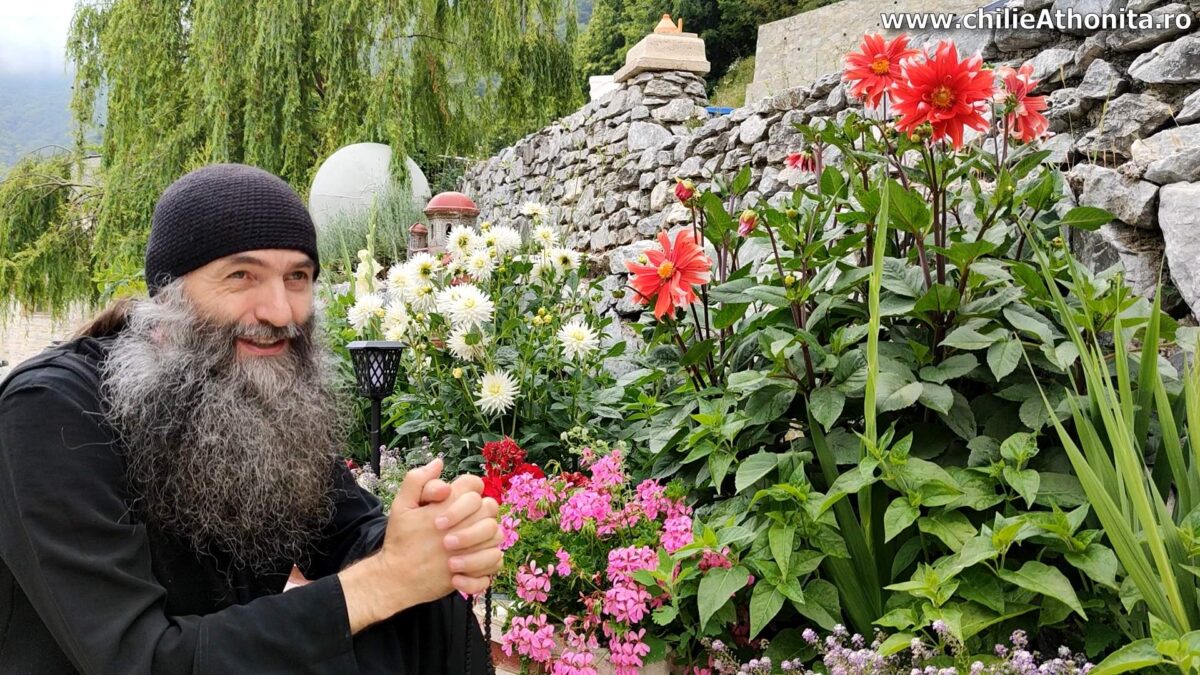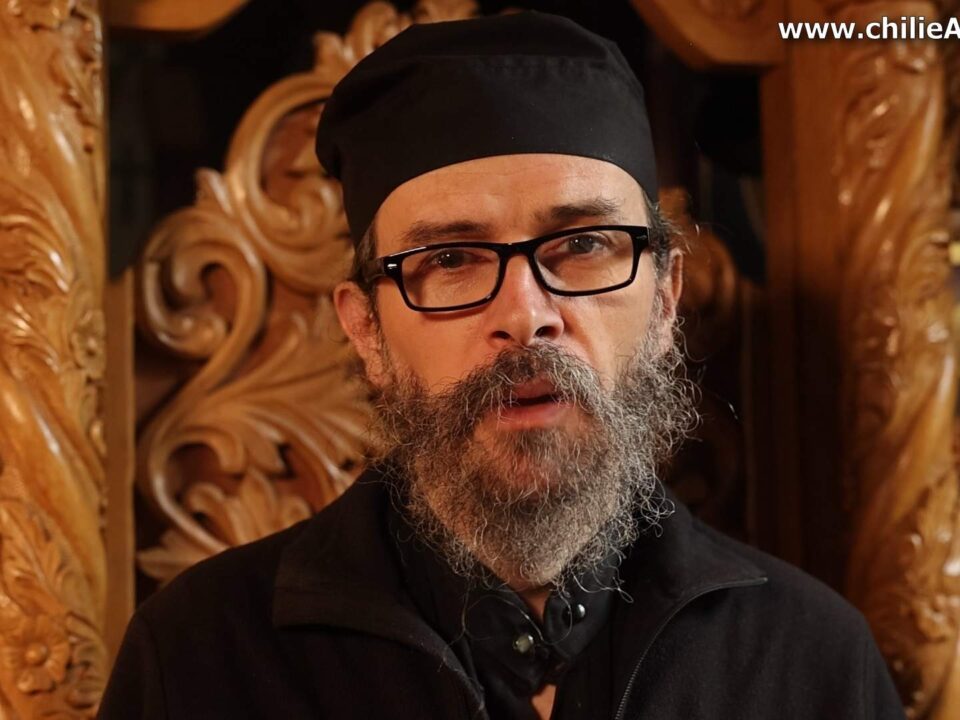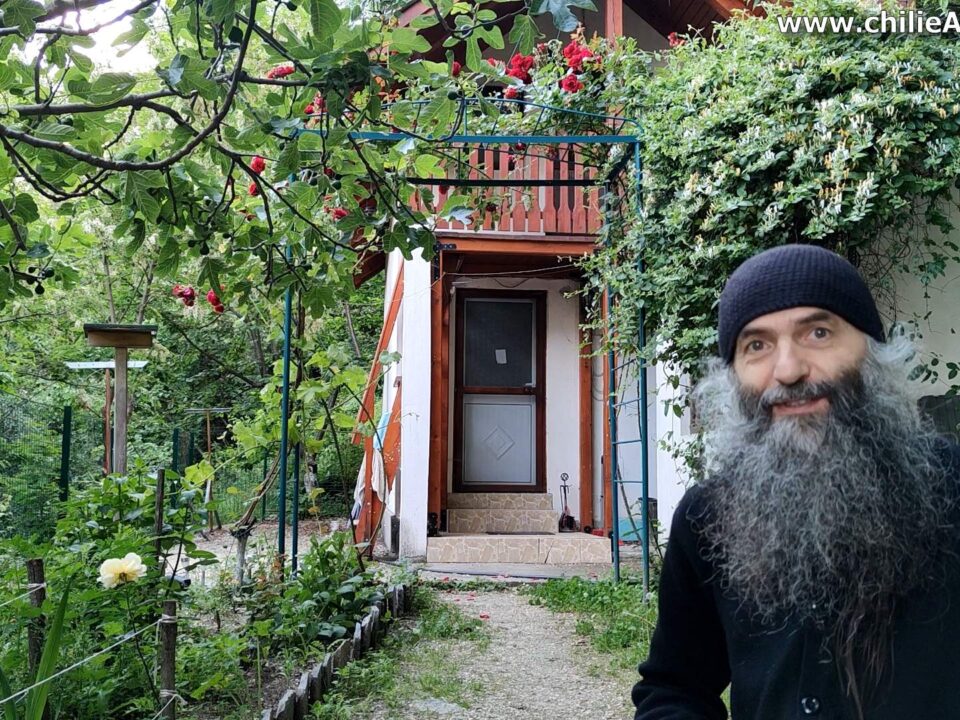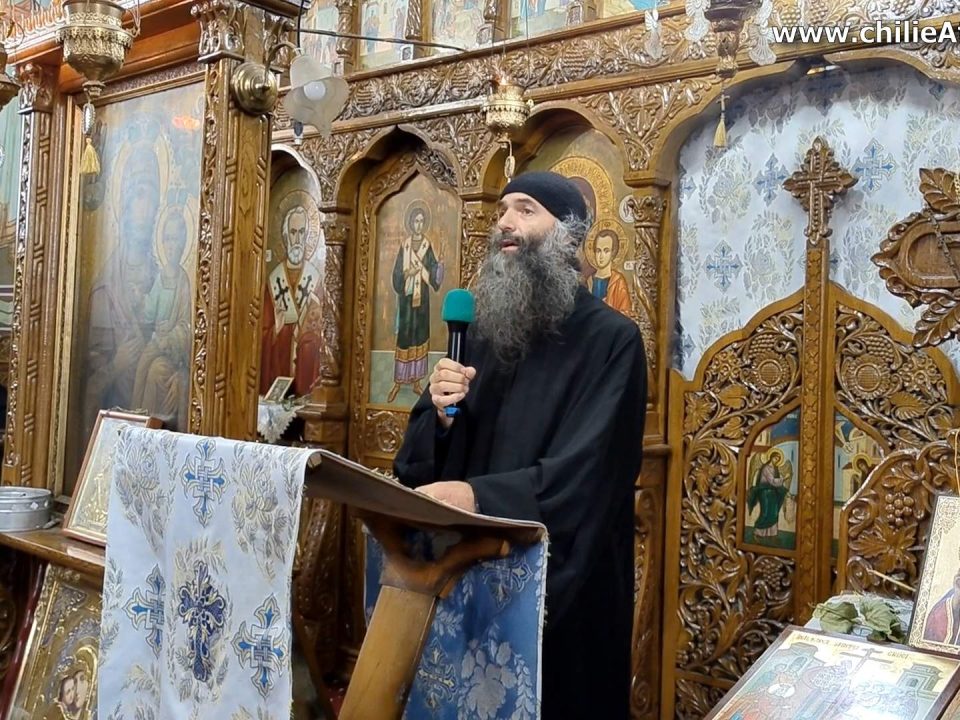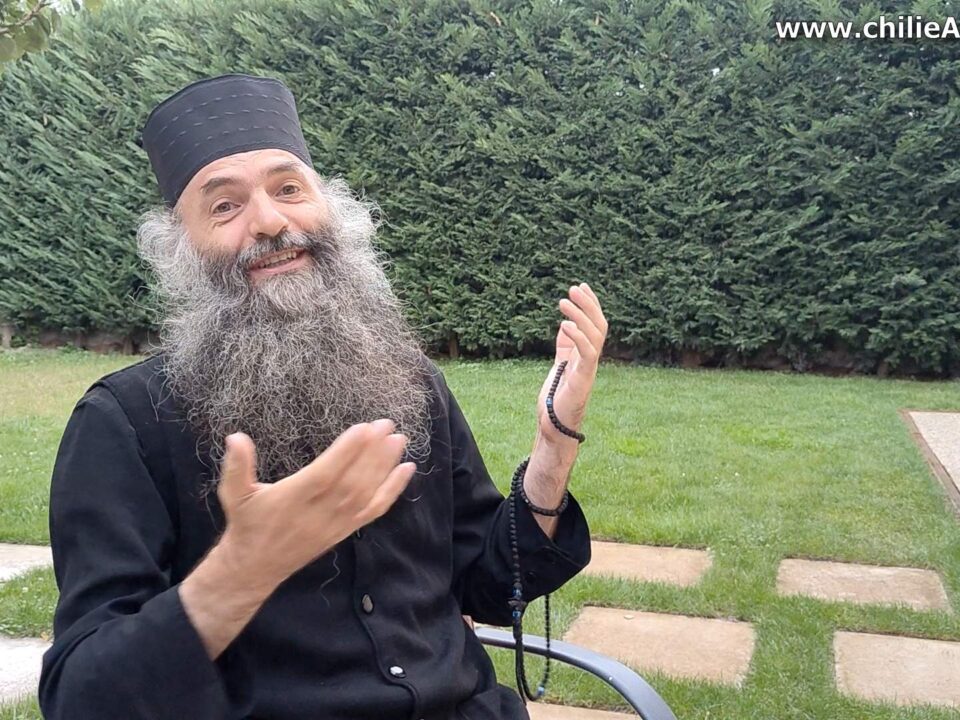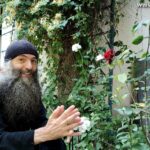
Our Cell: Virtual Tour of the Flowers – Fr. Pimen Vlad
22 June 2023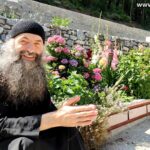
Legalization of Sins – Fr. Pimen Vlad
7 July 2023View a tribute to the Holy Apostles recounted with much grace, love and discernment by Father Pimen, from which we can extract many teachings.
Enjoy!
We meet again, my dear ones. I am trying to bring you into my world, the world of flowers. You saw in the last video that I have many flowers, but now there are even more in bloom. I’ve shut the gate for a bit; I hope no one bothers me, as this is a walkway where people come and go. Look at these flowers of all kinds, also there in the back, so rare in their beauty! As I’ve said before, flowers are from Heaven.
What shall we talk about now? We’ve reached the end of the fast. We celebrate the Holy Apostles Peter and Paul, the day after is the Feast of the Synaxis of the Holy Apostles. We see one thing… these two hold a special place in the Church, even the Savior gave them something more special. A day of celebration was set: The Holy Apostles Peter and Paul. Who were they?
Let’s start with the Holy Apostle Peter. He was the son of Jonah, a simple man, a fisherman, and brother to Saint Andrew, the first-called apostle. St. Andrew was the first called by the Savior, followed by the Holy Apostle Peter. We can call Saint Andrew the apostle of the Romanians and also of those around us, in the regions where he preached. The Holy Apostle Peter, going back, a simple man, followed the Savior with all the love, but let’s see, Holy Apostle Peter was married. The Gospel tells us at some point that his mother-in-law was ill, and the Savior came and healed her. We’re also told that he was a poor fisherman. The fishermen at that time worked at night, pulling in the nets to catch something, so he was on the poor side. Despite his fervor, saying “Lord, anything for You!” he eventually denied the Savior three times. He even warned him, saying: Peter, settle down, before the rooster crows tonight, you will deny Me three times. Do you see, the one who boasted he would die for Him faltered in the end?!
What does the Savior want to show us? The frailty of human nature, especially when we rely on ourselves. “Me?! I’ll do anything for God!” but when we face real danger, we may be the first to flee, to run away. We should never trust in our own strength; to be fighters because of our ego and our pride, saying “Lord, step aside because I will fix up the church!” No, never, on our own we are not good at anything. We are people with weaknesses, yet through God’s grace, we become strong, do you understand? So this is what He wanted to show us.
The Holy Apostle Peter, who boldly proclaimed he would follow Jesus no matter what, denied Him three times. Unlike Judas, who hanged himself, he embraced repentance and sorrow. He cried, feeling unworthy to face the other apostles, doubting his place among them. He was saying: “I have denied Him, how can I still be an apostle?” When the Savior appeared after the Resurrection, seeing his repentance, He asked: “Do you love me, Peter?”, “Yes, Lord, you know I love you.” He asked three times to restore Peter for each denial. As He was asking him a second and a third time, Peter felt his conscience ache deeper, “Lord, you know everything. You know I love you; why are you still asking me? You know I repent.” And the Savior replied, “Feed my sheep!”
So, He restored Peter’s honor and granted him the keys of the Kingdom. But why? He was someone who was married, he knows what marriage is, struggle, family and hardships. He denied Christ, so he knows what human frailty means when you believe in yourself. And in this way, he can be lenient with everyone. He was forgiven by the Savior, afterwards when he asked, “Lord, how many times must we forgive our neighbor, up to seven times?” “Not seven times, Peter, but seventy times seven!” This means we should forgive endlessly, no matter how many times our neighbor wrongs us.
He was prepared for what was to come, and we see how much grace God bestowed upon him afterwards. It’s said that his shadow, wherever he passed, healed the sick, and the cloths he touched, people would take them and be healed by touching them. God granted him such gifts to teach us how far repentance and sorrow can take us. By having these, we can reach holiness.
Let us return to the Holy Apostle Paul: he was originally Saul of Tarsus. He was of Jewish descent but born in Rome, as his parents had returned to Jerusalem. Thus, he also held Roman citizenship. Coming from a line of Pharisees, fervent, Saul persecuted Christians. When Saint Stephen was persecuted, Saul was present, standing and watching over Holy Apostle Stephen’s clothes. He was young and said that he too would’ve wanted to throw stones to kill him. Filled with zeal, he thought he was upholding the old law. He carried a paper that allowed him to travel freely throughout the Roman Empire, so not only in Jerusalem, but to Damascus, everywhere he could, where the Roman Empire was, in order to persecute and kill Christians. Exactly how it says that “The time is coming when whoever kills you will think that he is offering service to God.” By persecuting Christians, he believed that he was serving God, persecuting and killing others, in the name of the law. But on the way to Damascus, the Savior appeared to him in a blinding light and unprepared for such a revelation, he fell to the ground and became blind. “Saul, Saul, why do you persecute Me?” “Who are You, Lord?” Recognizing the immense light, he realized He was God, “I am Jesus Christ, Whom you are persecuting.” That’s when he woke up, so to speak, “He is God and I am persecuting Him?”
We know the rest of his life with Ananias, the Apostle who healed both his physical and spiritual sight, and thus Saul awakened to the truth that Jesus Christ, whom they had persecuted and crucified, was indeed God, He is God. From that moment he began to defend Christianity with even greater zeal. At first, the apostles were running away from him, but they soon trusted that he had genuinely changed with his whole heart. So now the others, the Jews and Pharisees sought to kill him. The one who was the strongest among them, the most educated, turned against them.
Many times they tried to kill Holy Apostle Paul. Doesn’t it say that many times they sought him and God saved him, in various ways? After that, what did God do, what did He say to Ananias? Even him, who had healed him, hesitated, questioning why he should help someone who had persecuted Jesus, but God reassured him, saying, “He is a chosen vessel of Mine to bear My name before the Gentiles”—to all the pagan nations. Thus, his ministry began. As it is said in his life and everywhere that Holy Apostle Paul did the most mission work.
He traveled continuously through so many countries, enduring persecution and violence, yet God never abandoned him. God was with them, He helped them all the time, until it was time for their own martyrdom, when He deemed their earthly mission complete and took them. We see that all the apostles went to God through martyrdom. And Holy Apostle Paul, from being a persecutor, and everything he went through, God granted him great grace, but he remained in humility, always remembering his past actions against Christians. He witnessed their deaths and took pleasure in it, and when praised, he remained humble, reflecting on his earlier deeds, he had reasons to be humble.
The Holy Apostle Peter likewise. Do you see who God placed at the forefront? Those who had reasons to be humble. They were aware of weakness since they too fell in their time. Even the other apostles, each faced his own struggles. The Holy Apostle Thomas journeyed through India, spreading the faith despite countless difficulties. From their lives, we see the paths they traveled, the battles they fought, and did what they could.
Do you see how wonderful they are? Twelve poor, simple, illiterate men turned this world upside down, they confounded philosophers, wise men, and emperors everywhere. They couldn’t grasp what was happening because they couldn’t see that these twelve were sent by God, they were God’s Apostles. Their teaching wasn’t human; that’s why no one could destroy it, no matter how much they persecuted and tortured them. Even at the end, when these apostles faced martyrdom and their oppressors believed they had succeeded—but like the wheat that, when it rots, gives rise to many new grains—these simple men spread Christianity throughout the world. Not by plane, not on the internet or through mass media, but on foot, rod in hand, walking from house to house. Just think about the incredible feat they accomplished; the sacrifice they made was immense.
Only one of the apostles, the Holy Apostle and Evangelist John, who was persecuted and exiled to Patmos and Ephesus, did not die a martyr’s death. It is said of him that he was the beloved disciple to whom the Mother of God was entrusted and he was entrusted to her, as her son. As we see, God allowed him to live to a ripe old age instead of facing a martyr’s death. God’s work was done through him; in Patmos, he penned the Revelation. He had some revelations.
John is called the apostle of love, he had very much love, even to the point of sacrifice. And God allowed him to remain on earth until the end. He cared for the Mother of God as if she were his own mother. Now, the Holy Apostles are in heaven. The Savior tells us that at the judgement the Mother of God, whom many hate, persecute, and curse, she will stand at His right. Whenever He makes decisions, the Savior will always look to her. On His left will be Saint John the Baptist, the Forerunner of the Lord, who baptized the Savior and met a martyr’s death. At their feet, on twelve thrones, the twelve apostles. Did you understand?
The Savior together with the twelve apostles will judge the world, because they have Christianized it, leading all back to God. The apostles now have the right, along with the Savior, to judge the world. Can you grasp the honor given to them to be with Him and judge? Therefore, know that their intercessions have great power with God. Pray to the Holy Apostles, seek their help, and those who maybe couldn’t until now, always keep their fasts to make them our friends, they are great, wonderful saints. When you can, read their lives and you will see how each one’s ended, how they struggled.
Dear ones, this is what I wanted to share about the Holy Apostles. What else can I tell you? As summer approaches, try to rejoice in it. Gather your family and head to the sea or the mountains, wherever you like, but let it not be just fun. Combine things a little bit. Wherever you go, explore and find places of worship, perhaps a little monastery somewhere. It doesn’t mean that if you’re at the seaside and it’s a holiday or Sunday, there’s no church anymore. Go so that you can attend a Holy Liturgy. Don’t forget about God; not everything should be worldly. Enjoy your time with family, no matter where you are, but also remember we have a soul, which is eternal and has its own needs.
We mustn’t nourish only our bodies, for the body will one day leave, but the soul goes to God and we’ll regret not doing more for it, not caring for it properly. Yes, dear ones? Combine, as they say, the useful with the beautiful! There are so many wonderful places! I’m not insisting you come to Greece, but here you’ll find everything: magnificent blue sea and countless wonderful places of worship. From here, there are daily cruises around Mount Athos, with two or three trips from Ouranopoli to Saint Anna, during certain times, on the other side from Ierissos to Vatopedi Monastery as well, where the Belt of the Mother of God or the holy relics are brought out, and on this side I’ve mentioned from Ouranopoli to here, at the Xenophontos Monastery they also take out the relics. So, those who want, can come to Ouranopoli: they find beautiful sea, they can take a cruise and if they get the chance, men with their sons can head to Athos while women can go on a cruise.
Or they can head to other parts of Greece: at Souroti is Saint Paisios, at Thessaloniki there is Saint Demetrius, Saint Gregory Palamas, Saint Theodora, many other places there. Further, in Evvia, there is Saint John the Russian, a bit higher up is the monastery of Venerable David, where you’ll find Venerable Iakovos Tsalikis, with plenty of miracles there. Even further on towards Athens, at Volos, you’ve got the Panagia Kato Xenia Monastery, where there is a piece of the belt of Mother of God and her miracle-working icon. In Athens, at Nea Makri is the monastery of Saint Ephraim, a great wonder worker. From there, as I mentioned before, we can head to Saint Nectarios in Aegina, a wonderful island I discovered last year when I spent a few days there. There’s plenty to see on that wonderful island of St. Nektarios, who is a wonderful saint who works many miracles. And you can even take a short break there – there are beautiful places.
In Patra, you’ll find Saint Andrew, in Kefalonia, there’s Saint Gerasimos, in Zakynthos is St. Dionysius; both have whole holy relics. Or those who want can go to Kavala, it is beautiful there, or like many who come to Thassos for a vacation. From Kavala there is a boat and you can also go to Lesbos Island. The journey is a bit long, it takes about nine hours, but it’s picturesque. There, on Lesbos Island, are Saints Raphael, Nicholas, and Irene, about whom I’ve written two books. They work so many miracles, the Saints Raphael, Nicholas, and Irene on the island of Lesbos, they are so wonderful. There at Mytilene is the town, there is the port where the ship pulls in and from there you can go to the saints. And also, just thirty minutes, almost an hour from Saint Raphael lies Mandamados, where Holy Archangel Michael is, there’s a monastery. I’ve written about how many miracles St. Archangel Michael does there. So many beautiful places to you can rejoice in. Remember to combine them a little and don’t forget about the soul.
Don’t totally forget, don’t prefer [going to] exotic islands far away, where you are distant from God. Don’t think that those places are more beautiful – they are promoted more, but perhaps they are without God. There might not even be a church nearby, and some areas are steeped in sin, you don’t really know how much you gain from such visits. Try to strike a balance, remembering your soul wherever you go!
I will end it here. May the Mother of God help us, watch over us, but let us not forget her either! As I’ve said before, let’s befriend the saints and they will aid us. And the Mother of God, as our queen, as our mother who cares for us and who stands at the right hand of the Savior – let us never forget about her, ask for help, and she will help us a lot. She will take us into her arms, she will take care of us all, from small to great. Always keep an icon of the Mother of God in your pocket and seek her help. When you leave the house: “Mother of God, help me!” when you return, say: “Mother of God, thank you.” Do that and you’ll see how much help we will receive.
May the good God, the Mother of God and all the saints help us! Lord, help us!
Online commemoration lists and donations
May the Lord help us!
Online Commemoration Lists and Donations
May the Lord help us!
If you have a bank card and wish to send commemoration lists and donations online using your card, and/or to support our philanthropic activity, including this site, please fill out the form below to make a small donation. The form is secure – we use Stripe for payment processing – a world leader in this field. We do not collect your personal data.
If you do not have a card, or do not wish to use it, visit the webpage for Online Donations and Commemoration Lists.
We will pray for your loved ones! (Please do not include inessential details like wishes, degree of kinship, introductions etc. JUST the name!)
Especially for recurring commemoration lists, we ask that you please keep them to under 20 names long. If you include a member of the family, we add “and for their families.”


